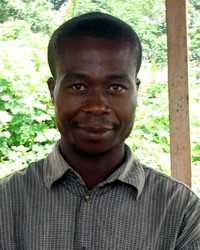Bakoum in Cameroon

Photo Source:
Richie Rice
|
Send Joshua Project a map of this people group.
|
| People Name: | Bakoum |
| Country: | Cameroon |
| 10/40 Window: | No |
| Population: | 20,000 |
| World Population: | 20,000 |
| Primary Language: | Kwakum |
| Primary Religion: | Christianity |
| Christian Adherents: | 70.00 % |
| Evangelicals: | 2.50 % |
| Scripture: | Translation Started |
| Ministry Resources: | No |
| Jesus Film: | No |
| Audio Recordings: | Yes |
| People Cluster: | Bantu, Central-Congo |
| Affinity Bloc: | Sub-Saharan Peoples |
| Progress Level: |
|
Introduction / History
The Bakoum people dwell in the east region of Cameroon, southwest of the region's capital city Bertoua, in Douma and Dimako. The land of the east region consists of a complex topography that includes a wide variety of environments, such as forests, savannas, mangroves, valleys, and plains. Because these environments can be found all over Cameroon in different locations, one could say that the east region is a sort of "Cameroon in miniature."
The Bakoum are part of the Bantu, a Central-Congo people cluster. They only live in Cameroon.
What Are Their Lives Like?
The Bakoum struggle to survive by living off of the land and the dense rainforest (where both legal and illegal logging is a problem) as subsistence farmers, producing mostly fruits and vegetables such as corn and mangoes. The Bakoum use a "slash-and-burn" technique for farming, meaning they will clear areas of forest in which to grow crops using machetes and fire. This method yields high amounts of crops quickly but also quickly drains the soil of its nutrients, making it necessary for the Bakoum to move their farms every three to five years (excluding banana and plantain farms). Some Bakoum also work as shopkeepers in local markets, selling items ranging from meats and vegetables to clothing and cellular telephone service.
They use local resources to build their houses; the lower class Bakoum people live outside of local towns and use dried mud brick, wooden posts, and thatch roofing made from Rafia leaves, while the upper-class live in town and use cement blocks and metal roofing for their houses. They are also starting to use wooden planks for the walls of their houses.
The dress of the Bakoum is a mixture of western and Cameroonian style. On any given day, one may encounter a Bakoum dressed in long pants and a t-shirt or collared shirt, and then another dressed in brightly colored, loose-fitting traditional garb that may or may not have patterns. It is common for the Bakoum to dress their best for church, with preachers often wearing suits.
Bakoum children are typically educated in public schools, and many have access to a complete education. Many Bakoum live in close proximity to the Baka people, often setting up camps literally right next to their Baka neighbors and right next to rural roadways. Thus, the lives of the two peoples are often intertwined. They may even use the Baka Language to communicate with the Baka people. Otherwise they will use French, which they also use to communicate with other peoples. Traditionally, the Bakoum have spoken their own language (Kwakum) to their kinsmen, but many young Bakoum have started speaking together in Camfranglais, a mixture of Douala, Ewondo, French Pidgin and English.
What Are Their Beliefs?
Several different religions can be found among the Bakoum people, including Christianity, Islam, and Animism. There have been reports of witchcraft taking place throughout the east region. While Christianity boasts a very high percentage among the Bakoum people (70%), evangelicalism is of a much lower percentage (2.5%). Christian churches (loosely defined) present among the Bakoum include the Catholic, Presbyterian, Full Gospel, Seventh Day Adventist, Apostolic, and Christian Assembly churches.
What Are Their Needs?
Unfortunately, due to the lack of a Bible translation in the Bakoum language and a lack of discipleship, the Bakoum Church is very immature. Evangelicals worship in the trade language (French) instead of their heart language, resulting in a shallower level of biblical knowledge and understanding. This, in turn, leads to syncretism in the church, as well as a lack of holiness among its members. However, survey workers have observed a hunger for more of God and his word among the Bakoum, even resulting in the formation of an indigenous Bible translation committee and an inter-church language committee.
Due to the dense forests and warm climate, the east region is home to many tropical diseases including malaria (predominant), dengue fever, typhoid fever, and tuberculosis. There are also poor sanitation practices which cause even more deadly illnesses and diseases such as hepatitis A and bacterial dysentery. These difficult and underdeveloped conditions cause many deaths among people in the east region, including the Bakoum. Sadly, their infant mortality rate is about 5% and the normal life expectancy is only 52 years.
Prayer Points
Pray for sanitation, water, and health care development in the east region of Cameroon.
Pray for Christian workers who have begun the initial steps to provide a Bible translation in the Kwakum language and discipleship for the Bakoum church.
Pray for long and fruitful ministry and for more workers.
Pray that the Bakoum church would be submissive to God's word and willing to make the necessary changes to their faith and practice as they grow in the knowledge of God.
Pray for biblically qualified, indigenous leadership to be raised up in the Bakoum church (1 Tim 3:1-7; Tit 1:5-9).
Pray that the Bakoum people would be transformed into a people mature in Christ who love God's Word.